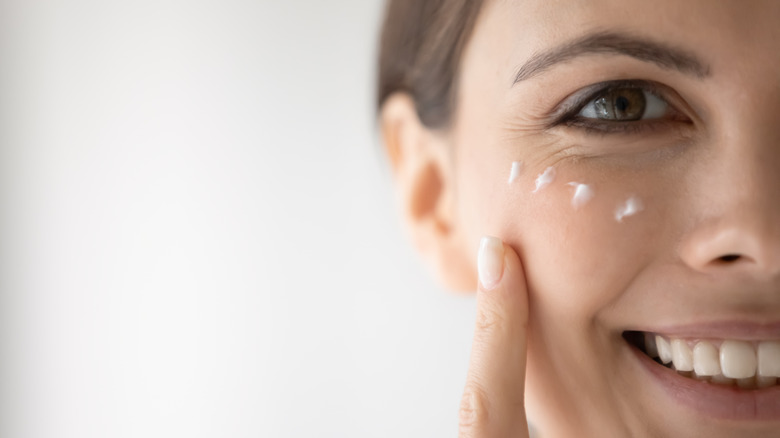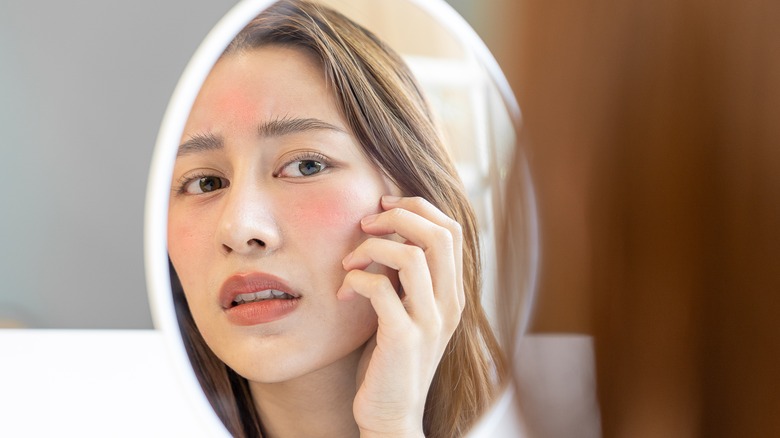Skincare Experts Reveal The Best Ways To Help Your Skin Recover From A Weekend In The Sun
No one has jinxed summer 2022 by calling it "hot girl summer" yet, but as we get closer, we can tell it's gearing up to be a fun-filled and sun-filled season for the books. That means a weekend schedule filled with plenty of patios, poolsides, and days in the park. But, with that comes a heavy dose of sun exposure. And even if you're prepped with a layer of SPF, you're still susceptible to the harmful effects of UV rays.
Preventative measures will always be important, no matter what, but after-sun care is also key to skin health and recovery. "The purpose of an after-sun product is to soothe, moisturize, heal, and prevent more damage," dermatologist Dr. Dendy Engelman explained (via Martha Stewart). In other words, there are targeted ingredients that work to rehydrate parched skin and help reduce the visible signs of aging.
With summer just around the corner, the natural skincare experts at Jurlique told us everything you need to know about sun-exposed skin and which skin-soothing ingredients will help you recover from a weekend in the rays.
All about sun exposed skin
Before we get into the best after-sun regimen, let's chat about what really happens to your skin after spending a weekend in the sun. We often believe that we're off the hook if our skin isn't red or burned, but the truth is that even a golden tan is a sign of sun damage. "The barrier function of the epidermis — or the top layer — of the skin has been compromised and is, in effect, leaking moisture," Dr. Francesca Fusco of Wexler Dermatology explained to Nylon. Therefore, the darker you get, the more dehydrated your skin. This is why soothing ingredients like aloe vera are beneficial post-sun. But, more on that later.
When considering that 80% of visible aging is caused by exposure to the sun, bronzed skin doesn't sound as appealing. Rebecca Nicholls, The Global Learning and Development Specialist at Jurlique, shared with us, "Visible signs of aging are often seen as dehydration, increased lines and wrinkles, loss of skin firmness and elasticity, and uneven skin tone or dark spots." Since our face, hands, and neck are the most regularly exposed areas of the body, they are the first to show premature signs of aging, and why a solid skincare recovery regimen is essential.
Ingredients and products that will help your skin recover
Environmental aggressors like UV rays and pollutants create free radicals in the skin, causing oxidative stress that breaks down collagen (via Albus & Flora). So after a weekend in the sun, it's critical to counteract the damage free radicals can cause with plant-based antioxidants. Look for serums and moisturizers that have ingredients like green tea, vitamin C, and turmeric extract.
Sun-exposed skin should be treated just as gently as sensitive skin, and the experts at Jurlique gave us the 4-1-1. "Most importantly, you should rehydrate, calm, and restore your skin after a weekend in the sun," explained Rebecca Nicholls from Australia's best-selling natural skincare line. Nicholls recommended using natural plant extracts such as calendula, chamomile, and self-heal, which are proven to help calm redness and inflammation on the skin. For an even deeper nourishment, Nicholls told us that products including serums and treatment masks are game-changers when it comes to "comfort and recovery of your skin." So what are you waiting for? Hit the mall for all things skincare.
Avoid these products after a weekend in the sun
Sun-exposed skin is highly sensitive, so naturally, there are products and ingredients you should avoid using. That being said, your usual skincare routine of chemical and physical exfoliators and anti-agers may need to be put on pause. Products such as AHAs, retinols, fruit enzymes, and citrus extracts should be left in the medicine cabinet as they may irritate sensitive and inflamed skin, Rebecca Nicholls, global learning and development specialist at Jurlique, told us.
You should also steer clear of alcohol-based products and fragrances after your pool party or beach outing, as "heavily-fragranced products are the number one cause of contact dermatitis in skincare," explained dermatologist Dr. Adeline Kikam (via Martha Stewart). "You do not want to [increase] your chances [of a reaction] when skin is already inflamed," Kikam continued.
It's important to conclude that while after-sun treatments are a critical piece of any person's skincare regimen, protecting your skin from the sun with SPF and shade in the first place should always remain your highest priority.



